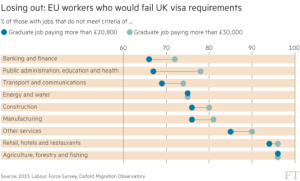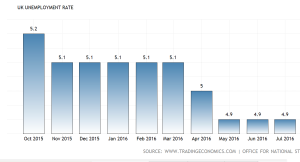Behind the Vote
Brexit. A coined term that filled Newsrooms, Facebook feeds, and local pubs all summer long.
Having joined the European Economic Community in 1973, the UK decision to revoke that membership on June 23rd sent shockwaves around the world, as countries questioned what the implications would be for their own economic relations and the European community at large. With ‘Leave’ capturing the vote by only 52% to 48%, the decision was highly controversial and has continued to cause market anxiety in the months since.
The unknown implications of Brexit on the workforce was a key issue heading into the vote, as many economists argued that a decision to leave would trigger an economic reversal in the UK. This meant that if the UK were to ban EU migrants from working in the UK then it could potentially create more employment opportunities for nationals.
With EU workers accounting for 6.6% of the workforce, the referendum drove voters to ask serious questions about long term job security and availability. Would Brexit make it easier for young people to find jobs in the UK? Would wages increase as the result of a decreased supply of labor? What would happen to those jobs of migrants forced to leave? Where will the UK stand in terms of the international workplace?
Some economists predicted that in the short term, organizations would choose to either transition their operations overseas or put a hold on hiring new employees until there was more economic certainty. Both scenarios would decrease labor demand, which could have an impact on overall employment levels.
However, it was and continues to be extremely difficult for economists to predict the outcome of the decision, as UK was the first nation to leave the EU and therefore was no precedent to compare it to. Similarly, if the UK had decided to ‘remain’, its trade and economic relationships with other EU countries could have been severely damaged due a lack of trust and increased tension.
In speaking about this uncertainty, Jurga McCluskey, head of UK immigration at Deloitte said, “Nobody really understands the complexity of leaving the EU because no one has ever left the club… If we leave, the landscape for immigration will change significantly — it won’t be so much what we do but who we chose to work with. Who will those migrants be?”
Immigrants and Employment Skill Levels
According to research by Oxford University’s Migration Observatory, as of June 2016, there were 2.2 million EU workers in the UK composing for 6.6% of the total workforce. Of that number, 10% were employed in the manufacturing sector and 8% were in retail, hotels and restaurants. Due to the fact that the UK relies heavily on EU workers to fill low-skilled roles, the vote has insinuated anxiety for both employers and employees across various industries.
The Oxford research also found that prior to the vote, three-quarters of EU citizens working in the UK would not meet visa requirements for non-EU overseas workers. As shown in the chart below, low-level jobs were not the only ones at risk, with EU workers in the banking and finance sector showing projected ineligibility levels of 65-70%.
This is significant because once law makers clearly define what the immigration policy will be, it will affirm the governments “vision” for the post-Brexit economy.
But do UK nationals really want those jobs?
While many argue that that Brexit will supply a large number of low-level jobs for UK nationals, we must also consider whether or not people are actually going to be willing to take them?
In a conversation with Amy Smith, a student at the University of Sheffield, she expressed her concern saying:
‘Having grown up in Germany I witnessed the benefits of immigration first-hand. Immigration is important for the job market – especially since Germany’s demographic structure shows a larger aging population. Because of this, Germany doesn’t have enough young people to fill all of the positions which are becoming available as more and more of the last generation retire. Immigrants are vital for filling the low level positions German natives are less willing to take. I think the UK needs to recognize that the same implications can and will happen here.’
This issue was further discussed by economist Jonathan Porte who described the demand for immigrant’s jobs as not being just a zero-sum game. In an article published by the Guardian he explained, “it’s true that, if an immigrant takes a job, then a British worker can’t take that job – but it doesn’t mean he or she won’t find another one that may have been created, directly or indirectly, as a result of immigration.”
This ties back to the idea that if the demand for certain jobs never existed, will the Brexit decision really change that?
Current State of the Workforce
It has been three months since the June 23rd vote, and economic numbers are showing more promise than expected. Although there was widespread fear that a decision to leave the EU would cause widespread job losses, economic data following Brexit is saying the opposite.
According to an August 2016 report by Telegraph, the post-Brexit economy saw a decrease in unemployment, an increase in consumer spending, and a government budget surplus. In July, the UK unemployment rate was at 4.9%, its lowest rate since 2005, and this number has remained unchanged according to August and September data.
So with these economic forces showing positive signs for the UK, does this mean that the workforce still has to worry?
Maybe not so fast.
While UK employment continues to rise, the country has seen a sharp rise in inflation which poses a major threat to job levels and wages. An August report showed that the UK’s CPI rose to 0.6% which was higher than expected, being up from 0.5% in June.
The Office of National Statistics spoke on this issue saying, “while there was no sign of the plunge in the value of the pound having an impact on CPI, the producer prices index (PPI) show that sterling’s slump had pushed up the cost of imports for British manufacturers, which could fuel inflation down the line.”
An increase in inflation could potentially affect the UK’s employment rate going forward, as the uncertainty of market can lead to lower investment and lower economic growth in the workforce. Furthermore, inflation can also trigger a lower export demand which could cause unemployment in various trading sectors.
Due to the fact that the official removal of the United Kingdom from the European Union may not happen for some time, economic uncertainties will continue to dictate discussion among economics and politicians alike.
Until Parliament makes an official decision on Brexit’s terms, workers and immigrants across the UK must patiently wait… and hope that the decision to leave didn’t take their jobs with them.
Sources:
https://www.ft.com/content/953671ba-b784-37f6-8f29-45402e846d50
https://www.theguardian.com/business/2016/aug/17/uk-unemployment-claimant-count-falls-after-brexit
https://www.ft.com/content/3d0de756-1764-11e6-b197-a4af20d5575e



Leave a Reply
You must be logged in to post a comment.